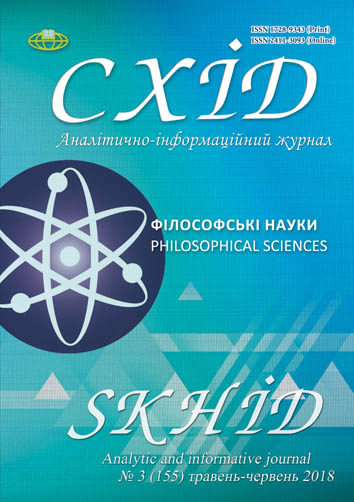The Problem of Gender and Women's Ordination: Variability of Interpretation in Different Concepts of Feminist Theology
DOI:
https://doi.org/10.21847/1728-9343.2018.3(155).139316Keywords:
gender, ordination, Protestantism, theology, feminismAbstract
The article offers an overview of the concepts of prominent representatives of feminist theology devoted to the gender problem in religion, and also analyzes the key features of Protestantism as a basis for the formation of women's ordination. The purpose of this article is to study the relation between the key principles of feminist theology, events within the Protestant denomination - Anglicanism and the emergence of women's ordination of the late of the twentieth century.
The author found that the emergence of feminist movements gave impetus to reassess the existing patriarchal traditions in Christianity, which assigns women only a minor role in the church and in the most radical reading reduces her essence to sin. The victory of the feminist movement in the secular sphere also had a significant influence in religious directions. Feminist theorists began exposing sexism in Christianity since the 1960s. At the same time there was the formation of separate direction of theology - feminist. Among the prominent representatives are S. Beauvoir, M. Daley, L. Irigarey, and others. Their works laid the new paradigm and the foundation for understanding the need for equality of gender relations in the religious sphere. Thanks to the efforts of activists of religious women's movements, such a denomination of Protestantism as the Anglican Church first revised its rules and allowed women to ranks of the hierarchy. Protestantism is the most loyal on the issue of the ordination of women from the three branches of the Christian tradition. This is due to the fact that a number of Protestant churches are characterized by the egalitarian tendency (position of equality).In 1994, the Church of England finally approved at the canonical level the women's right to the priesthood, and in the same year the first women were ordained priests. The conclusion comes by the issue of female priesthood arises as a synthesis of feminism and original interpretation of the theological doctrine of the priesthood in Protestantism: the priesthood for Protestants is not a san, but a post. In this connection, they consider that an obstacle to the ordination of women in ancient times was only a socio-cultural tradition of those times and today only need to restore justice and equal rights for women and men. In addition, the actualization of the question of the ordination of women in the holy ward is due to the absence of direct prohibitions in the Scriptures.Downloads
References
Lerner, Gerda. 1975. Placing Women in History: Definitions and Challenges. Feminist Studies 3, no. 1/2: 5-14. DOI: 10.2307/3518951.
Aivazova, S. 1991. Origins of feminism. Iskusstvo kino. № 6: 21-24 (rus).
Burns, S. (Ed.), Monro, A. (Ed.). 2015. Public Theology and the Challenge of Feminism. Routledge. London. DOI: 10.4324/9781315744223.
Lovibond, S. 1990. Feminism and Postmodernism. In: Boyne R., Rattansi A. (eds) Postmodernism and Society. Communications and Culture. Palgrave, London. DOI: 10.1007/978-1-349-20843-2_6
Mahon, J. and Campling, J. 1997. Existentialism and the Origins of Male Supremacy. In: Campling J. (eds) Existentialism, Feminism and Simone de Beauvoir. Palgrave Macmillan, London. DOI: 10.1057/9780230376663_12
Sukovata, V. 2004. Gender and religion. In: Fundamentals of the theory of gender. Kyiv: K.I.S: 383-425 (ukr).
Milano, A. 2011. Woman and love in the Bible. Eros, agape, personality [translat.]. Aleteya, St. Petersburg: 14-15 (rus).
Keller, H. 2003. Istoriya moyey zhizni = Story of My Life and Other Texts. Zakharov Publisher, St.Petersburgb: 145 pp. (rus).
Beauvoir, S. de & Vorobyova, N. [translat.], Vorobyov, P. [translat.], Sobko, I. [translat.] 1994. The second sex. Volume 1. Osnovy, Kyiv, 390 p. (ukr).
Daly, Mary. 1978. Beyond God the Father. Toward a Philosophy of Women’s Liberation, Beakon Press, Boston p.158.
Petrushkevych, M. 2012. Ordination of women as a manifestation of religious identity (sociocultural review). Ostroh Academy. № 9: 26-27.
Burega, V. 2012. The problem of "female priesthood" in modern Protestantism. Available at: http://www.bogoslov.ru/text/2364041.html (Accessed: 11.04.2018).
Andermahr, Sonya [ed.], Lovell, Terry [ed.] and Wolkowitz, Carol [ed.] 2000. A Glossary of Feminist Theory. London: Arnold; NewYork: Oxford University Press, P.99.
Downloads
Published
How to Cite
Issue
Section
License
Copyright (c) 2018 Iryna Starovoit

This work is licensed under a Creative Commons Attribution-NonCommercial-NoDerivatives 4.0 International License.
1. Authors bear responsibility for the accuracy of facts, quotations, numbers and names used.
2. Manuscripts are not sent back.
3. The publisher does not always agree with the authors' opinion.
4. The authors reserve the right to authorship of the work and pass the first publication right of this work to the journal under the terms of a Attribution-NonCommercial-NoDerivatives 4.0 International, which allows others to freely distribute the published research with the obligatory reference to the authors of the original work and the first publication of the work in this journal.
5. The authors have the right to conclude separate supplement agreements that relate to non-exclusive work distribution in the form in which it has been published by the journal (for example, to upload the work to the online storage of the journal or publish it as part of a monograph), provided that the reference to the first publication of the work in this journal is included.

